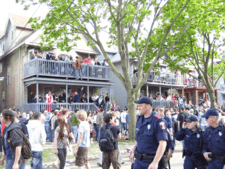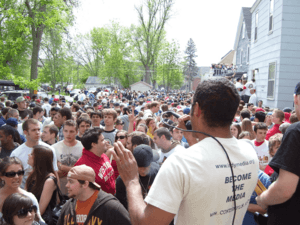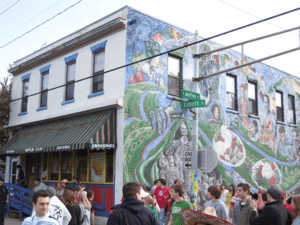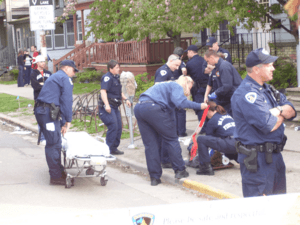Mifflin Street Block Party facts for kids
The Mifflin Street Block Party is a yearly celebration in Madison, Wisconsin. It takes place on Mifflin Street. Most people who attend are students from the University of Wisconsin–Madison. The party happens on the last Saturday of April.
This event started as a way for students to protest. Over time, it became more about having fun. It's a chance for students to relax before their final exams. The party often has local bands playing music. They perform on house porches, balconies, and in backyards. The city of Madison has not officially supported the party since 2012.
Contents
History of the Mifflin Party
The Mifflin Street Block Party began in 1969. It started as a street protest against the Vietnam War. Students danced in the street to show their feelings. The first party was on May 3. This date was chosen to mark one year since a student protest in France.
Students in Madison had strong feelings against the war. A big protest happened in 1967. Students and police had many disagreements. The first Mifflin party was part of these ongoing issues. Police did not allow the street dance. When they came to check a noise complaint, a conflict started. This lasted for three nights. It spread to other student areas. Students threw things at the police. They also built barriers to protect themselves. Police used tear gas and clubs. Many people were hurt or arrested. This included Paul Soglin, who later became mayor.
The party continued every year during the war. This was true even after the Sterling Hall bombing nearby. In 1979, the city tried to control the event. They created "Mifflin on the Mall" with music and food. But by 1982, students were back on Mifflin Street. The Mifflin Co-op, a local group, often helped with the party. They used it to raise money for good causes. The co-op stopped being as involved in 1991.
By 1990, police decided not to patrol the party. They removed their official presence. Even with over 10,000 people, there were no big problems until 1996. A small riot happened that year. After this, the city and police took more control. They now set the rules for the party. They spend a lot of money on policing.
On May 4, 1996, a small riot happened. A crowd threw bottles at a fire truck. The truck came to put out a bonfire. Students had started the fire to stay warm. Police used special gear to take back the street. The event caused damage to property. The 1997 party was planned carefully. But few people came because of bad weather. No major riots have happened since 1996.
Changes in the 21st Century
The block party used to be on the first Saturday of May. In 2005, students asked to change the date. They wanted it to be on the last Saturday in April. This would avoid conflicts with final exams. Mayor Dave Cieslewicz first said no. He worried about extra costs for the police. Students then said they would party both weekends. So, the mayor agreed to move the date. Student leaders promised to discourage parties in early May. The mayor asked students to help pay for the extra costs. The party was set for Saturday, April 29, in 2006.
In 2009, the city allowed a group called DCNY Pro to sponsor the event. This was the first time in over ten years a sponsor was allowed. With help from WSUM radio, they set up a music stage. It was at the corner of Bassett and Mifflin Street.
In 2020, the party was canceled. This was because of the COVID-19 pandemic. Police patrolled the streets that day. Houses playing loud music were warned to turn it off. The street was very quiet that year.
On April 25, 2021, many students gathered for the party. This happened even with the city's COVID-19 rules. Police reported only a few tickets were given. However, some students damaged a university staff member's car.
Police and Party Control
Between 1998 and 2002, a few hundred to a couple thousand people attended. But in 2002, about 20,000 people showed up. That same year, a small riot happened during Madison's Halloween party. This made police start to control the Mifflin event more.
The city has always said no to student ideas. Students wanted to close the street and run the party themselves. A Madison police officer once said, "We wish this event would go away." Since 2002, there have been more arrests. Also, fewer people have attended the party.
Related Events
- La Fete de Marquette
- State Street Halloween Party
 | Jackie Robinson |
 | Jack Johnson |
 | Althea Gibson |
 | Arthur Ashe |
 | Muhammad Ali |






